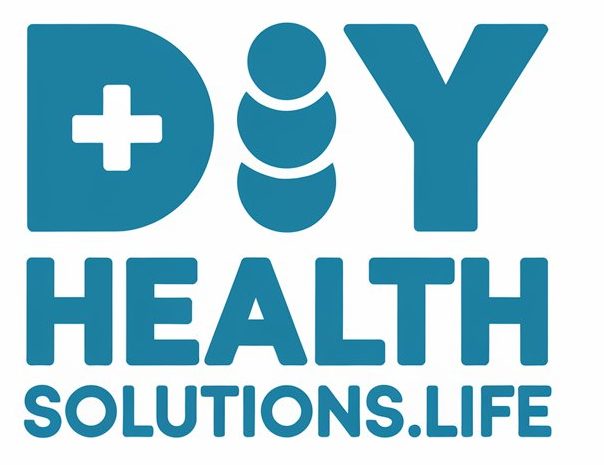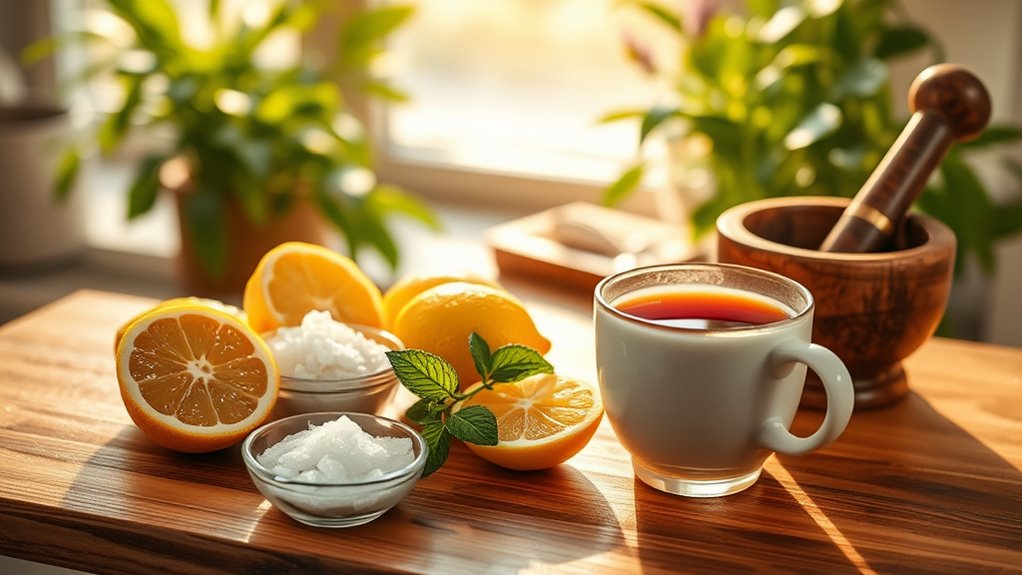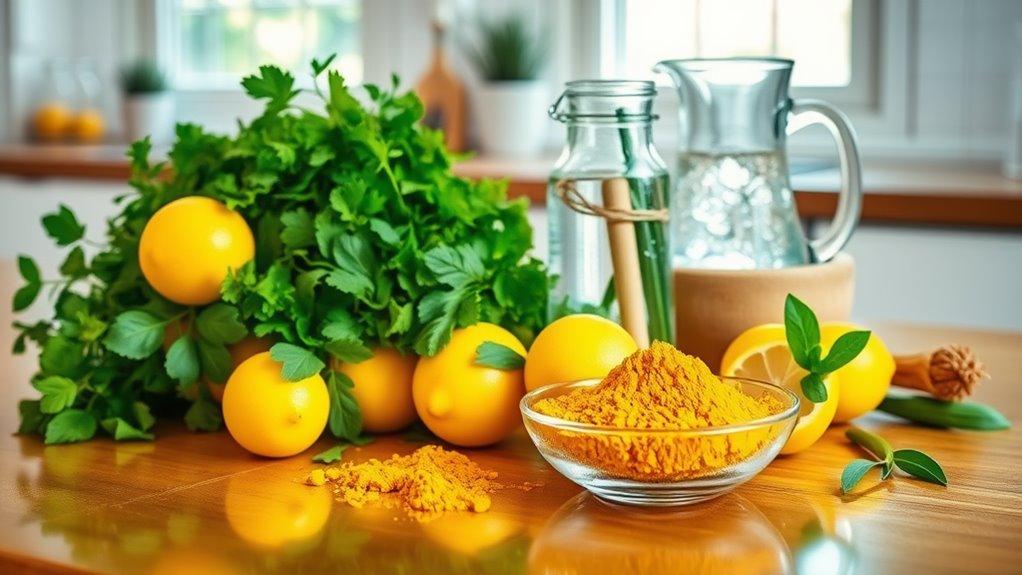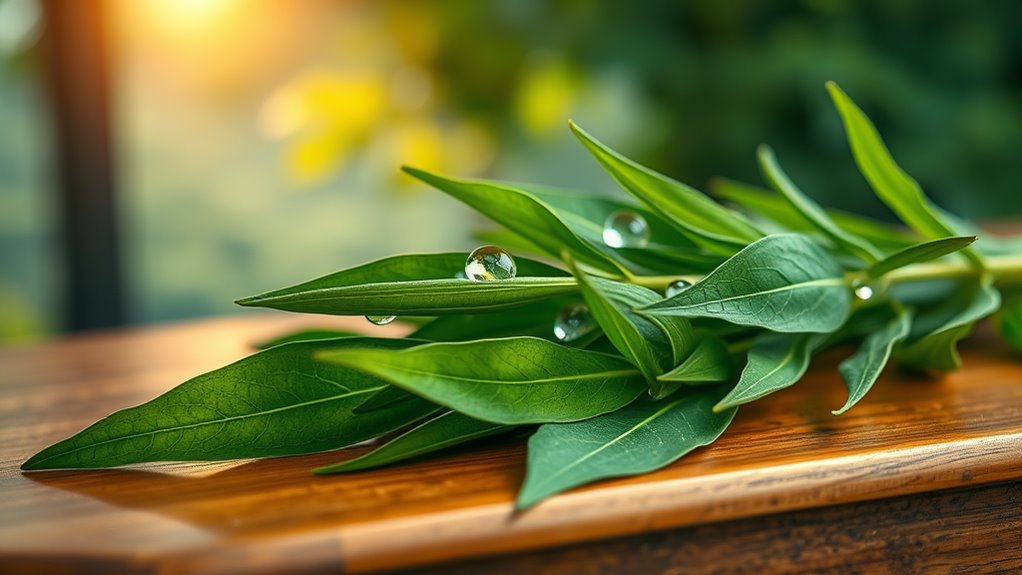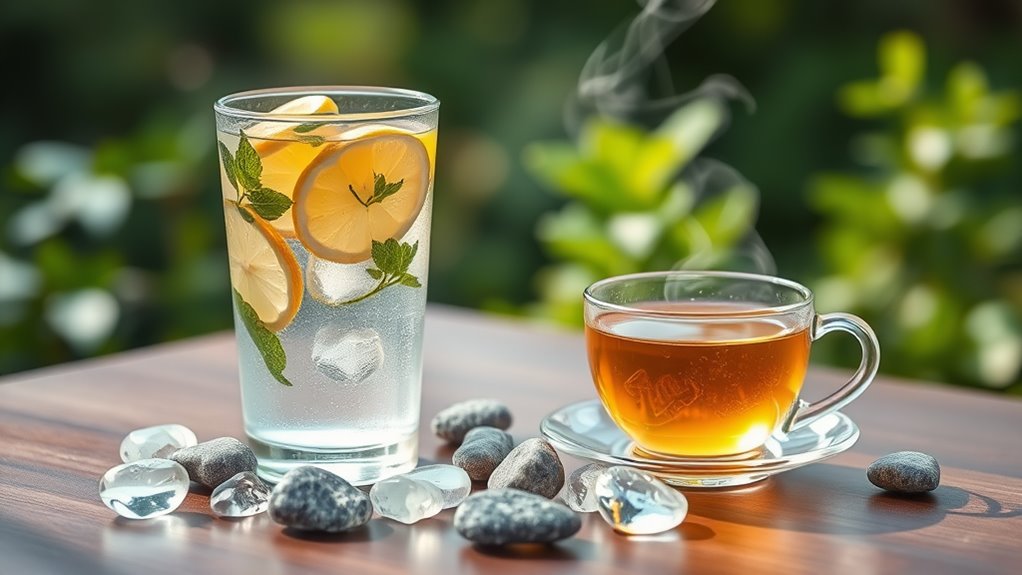Home Remedies for Painful Kidney Stones
Home remedies for painful kidney stones can help ease your discomfort. Staying hydrated is essential; drink plenty of water daily to dilute urine and flush out stones. Incorporate lemon juice, as its citric acid may dissolve certain types of stones. Herbal remedies like dandelion root and nettle leaf can support kidney health, while chamomile tea might reduce inflammation and pain. Additionally, adjust your diet by limiting high-oxalate foods and processed snacks. These changes can give your kidneys a fighting chance. If you want to explore more strategies for relief and prevention, there are additional insights available to reflect on.
Key Takeaways
- Hydration: Increase water intake to help flush out stones and reduce pain; aim for 8-10 cups daily.
- Lemon Juice: Drink lemon juice mixed with water; its citric acid may help dissolve certain stone types and promote hydration.
- Chamomile Tea: Consume chamomile tea for its anti-inflammatory properties to help relax muscles and reduce discomfort from kidney stones.
- Dandelion Root: Use dandelion root as a natural diuretic to potentially assist in flushing out kidney stones.
- Nettle Leaf: Incorporate nettle leaf tea into your diet to support kidney health and possibly prevent new stone formation.
Understanding Kidney Stones
Kidney stones can be a painful experience, and understanding them is the first step in managing their impact on your health. There are several kidney stone types, each formed from different substances. The most common types include calcium oxalate, uric acid, struvite, and cystine stones. Knowing the type of stone you have can help guide your treatment and prevention strategies.
Risk factors play a significant role in the formation of kidney stones. Factors like dehydration, a diet high in sodium or oxalate, obesity, and certain medical conditions can increase your chances of developing stones. For instance, if you consume excessive animal protein or sugary drinks, you’re more likely to experience stone formation.
Genetics can also influence your risk; if someone in your family has had kidney stones, your likelihood of developing them increases. Understanding these factors empowers you to make informed lifestyle changes.
Hydration and Its Importance
Maintaining proper hydration is essential in preventing kidney stones and managing overall kidney health. When you drink enough fluids, you help dilute the substances in your urine that can form crystals and eventually lead to stones.
The hydration benefits are significant; adequate fluid intake not only reduces the concentration of minerals but also promotes regular urination, which helps flush out toxins and prevent stone formation.
Aim for at least 8 to 10 cups of water a day, or more if you’re active or live in a hot climate. You mightn’t realize it, but even mild dehydration can increase your risk of developing stones.
Keep an eye on the color of your urine—light yellow indicates proper hydration, while darker shades could signal that you need to drink more.
Dietary Changes for Relief
When managing kidney stones, making certain dietary changes can greatly help.
Staying hydrated is essential, but you should also be mindful of the foods you eat.
Hydration Importance
Staying well-hydrated is essential for preventing and managing kidney stones. When you drink enough fluids, you help dilute substances in your urine that can form stones. This means you’re reducing the risk of painful episodes and supporting your kidneys in flushing out toxins effectively.
To reap the hydration benefits, aim for at least 8-10 glasses of water daily, or more if you’re active or live in a hot climate. One of the best hydration tips is to carry a water bottle with you throughout the day. Set reminders on your phone to encourage regular sipping.
If plain water feels boring, try adding slices of lemon or cucumber for a revitalizing twist—these can also provide additional benefits.
Pay attention to your urine color; light yellow indicates good hydration, while darker shades suggest you need to drink more. Herbal teas and clear broths can also contribute to your fluid intake.
Foods to Avoid
While staying well-hydrated is essential for preventing kidney stones, what you eat also plays a significant role in managing your risk. Making some dietary changes can help reduce the likelihood of painful stones forming.
Here are some foods you should consider avoiding:
-
High Oxalate Foods: Foods like spinach, rhubarb, and beets are high in oxalates, which can contribute to kidney stone formation. Limiting these can be beneficial.
-
Salt and Processed Foods: High sodium intake can lead to calcium retention, which increases kidney stone risk. Cut back on salty snacks, canned foods, and restaurant meals to help manage your sodium levels.
-
Sugary Drinks: Sodas and sweetened beverages can increase your risk of stones. Opt for water or herbal teas instead to stay hydrated without added sugars.
Herbal Remedies to Consider
Exploring herbal remedies can offer a natural approach to managing kidney stones. You might consider incorporating essential herbs and natural extracts into your regimen to help alleviate the discomfort associated with these stones.
One popular option is dandelion root, known for its diuretic properties, which can encourage urine production and potentially help flush out stones.
Another effective herb is nettle leaf, which can support kidney health and prevent the formation of new stones. You can consume these herbs as teas or supplements.
Cranberry extract is also worth considering; it’s often used to prevent urinary tract infections and may help in reducing stone formation.
Similarly, lemon juice, rich in citric acid, can help dissolve certain types of stones and promote hydration.
Additionally, you might find relief with turmeric, which has anti-inflammatory properties that can ease discomfort.
Combining these herbs into your daily routine could provide relief and support your overall kidney health.
Remember to consult with a healthcare professional before starting any new herbal treatments, as they can interact with medications or existing health conditions.
Pain Management Techniques
When dealing with kidney stone pain, effective management is essential.
Staying hydrated, incorporating herbal remedies, and making dietary adjustments can greatly help alleviate discomfort.
Let’s explore how these techniques can support you in traversing this challenging experience.
Hydration Importance
Staying well-hydrated is essential for managing kidney stone pain and preventing future occurrences. When you increase your water intake, you help dilute the substances in your urine that can lead to stones.
Here are some hydration tips to keep in mind:
-
Aim for 8-10 glasses a day: This is a general guideline, but your needs might vary based on your activity level and climate.
-
Incorporate hydrating foods: Foods like cucumbers, watermelon, and oranges can boost your hydration while providing essential nutrients.
-
Set reminders: Use your phone or a water tracking app to remind you to drink water throughout the day.
Herbal Remedies
Managing kidney stone pain can feel overwhelming, but herbal remedies can help ease discomfort and support your recovery. Many people find relief through various herbal teas and natural supplements, which can provide soothing effects and promote healing.
One popular option is chamomile tea. Its anti-inflammatory properties can help relax your muscles and reduce pain.
Additionally, dandelion root tea is known to support kidney function and may assist in flushing out stones. You could also try nettle leaf tea, which acts as a natural diuretic, helping to increase urine flow and potentially easing the passage of stones.
Natural supplements like magnesium and potassium can also play a role in pain management. Magnesium may help relax the muscles in your urinary tract, while potassium can help regulate fluid balance and reduce the risk of stone formation.
Before starting any herbal remedies, it’s always wise to consult with your healthcare provider, especially if you’re taking other medications.
Dietary Adjustments
Making dietary adjustments can markedly impact your comfort and health when dealing with kidney stones.
By focusing on nutrient balance, you can help manage your symptoms and potentially reduce stone formation. Here are three key dietary changes to contemplate:
- Stay Hydrated: Drinking plenty of water helps dilute substances in your urine that could form stones.
Aim for at least 8-10 glasses daily, and increase your intake if you’re physically active.
- Manage Calcium Intake: While you need calcium for overall health, excessive intake can contribute to stone formation.
Balance your calcium sources by including low-oxalate foods like dairy, leafy greens, and fortified products, while avoiding high-oxalate foods like spinach and rhubarb.
- Limit Sodium and Sugar: High sodium levels can increase calcium in your urine, while too much sugar, particularly fructose, can lead to kidney stones.
Opt for whole foods and reduce processed snacks to keep sodium and sugar in check.
Preventative Measures to Adopt
Although kidney stones can be painful and disruptive, adopting a few simple preventative measures can greatly reduce your risk of developing them.
Start by making lifestyle changes that promote kidney health. Hydration is key, so aim to drink plenty of water throughout the day. This helps dilute substances in your urine that can form stones.
Incorporating a balanced diet rich in fruits, vegetables, and whole grains can further support your kidneys. Avoid excessive salt and sugar, as they can contribute to stone formation.
Regular physical activity is also essential; it helps maintain a healthy weight and reduces the risk of developing stones.
Stress management is another crucial aspect of prevention. High stress levels can impact your overall health and may exacerbate conditions leading to kidney stones.
Engage in relaxation techniques, such as yoga or meditation, to help keep stress at bay.
Frequently Asked Questions
Can Kidney Stones Cause Other Health Complications?
Yes, kidney stones can lead to complications like urinary tract infections and kidney damage. If left untreated, you might face long-term effects, including chronic pain or impaired kidney function. It’s essential to seek medical advice.
How Do I Know if My Kidney Stones Are Severe?
You’ll know your kidney stones are severe if you experience intense pain, especially if it worsens over time. Additionally, if you notice changes in your urine, such as blood or cloudy appearance, seek medical attention immediately.
Are There Any Specific Symptoms to Watch For?
When it rains, it pours. Watch for severe symptoms like intense pain, blood in urine, or persistent nausea. Common indicators include frequent urination and lower back pain. Don’t ignore these signs; consult a healthcare professional.
Is It Safe to Use Supplements for Kidney Stones?
It’s essential to evaluate supplement safety before trying any options. While some natural alternatives may help, always consult your healthcare provider first to confirm they’re appropriate for your specific situation and won’t cause complications.
Can Kidney Stones Lead to Kidney Infections?
Yes, kidney stones can lead to kidney infections. When stones block urine flow, bacteria can thrive, increasing infection risk. It’s crucial to seek prompt medical attention if you experience symptoms like fever or severe pain.
